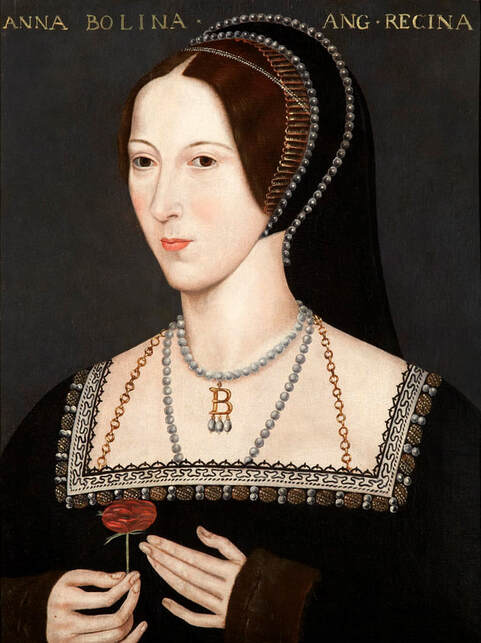|
A complex story ...
Anne Boleyn is one of the most fascinating and controversial figures in English history. Her rise to power as Queen of England was followed by a dramatic fall from grace, culminating in her swift execution in May 1536. The reasons for Anne Boleyn's execution are complex and multifaceted, and historians have debated them for centuries. They will, no doubt, continue to do so for many more! However, there are several key factors that have been cited as contributing to her downfall. Anne Boleyn failed to produce a male heir. One of the most significant factors that led to Anne Boleyn's downfall was her inability to produce a male heir. When Anne married King Henry VIII in 1533, he was desperate for a son to secure the Tudor dynasty's future. However, Anne gave birth to a daughter, Princess Elizabeth, in 1533, followed by a miscarriage in 1534. By 1536, when it was clear that Anne was not pregnant again, Henry began to look for ways to end the marriage. As historian Eric Ives explains: "Henry's frustration at Anne's failure to produce a son was a critical factor in her downfall. He had married her for love, but he needed a son to secure the Tudor dynasty's future" (The Life and Death of Anne Boleyn, p. 198). In this sense, Anne’s primary ‘failure’ to provide a son was the same as that of Katherine of Aragon. Anne Boleyn was accused of adultery and treason. Anne Boleyn was accused of committing adultery with multiple men, including her own brother, and treason king. The discussion of Henry’s eventual death with the court musician Mark Smeaton - merely imagining the death of the king - was treason. These charges were largely based on hearsay and rumors, but they were enough to condemn her to death. The most damning evidence against Anne was the testimony of her accusers, who included her former friend and lady-in-waiting Jane Boleyn. As historian Retha Warnicke notes: "The primary charge against Anne was that she had committed adultery with various men, including her own brother, and plotted the king's death. The evidence was largely circumstantial and based on rumors, but it was enough to convince the jury that Anne was guilty" (The Rise and Fall of Anne Boleyn, p. 177). Anne Boleyn's religious views were seen as a threat. Anne Boleyn was a strong advocate for the Protestant Reformation, and her religious views were seen as a threat by many in the Catholic establishment. Anne had studied the writings of Protestant theologians such as William Tyndale and had introduced Henry to the ideas of the Reformation. As historian G.W. Bernard writes: "Anne was seen by many as a religious radical who threatened to undo the established order. Her advocacy of the Protestant cause made her vulnerable to accusations of heresy and treason, which were used to justify her execution" (The King's Reformation, p. 100). Henry VIII was no longer in love with Anne. Finally, it is worth noting that Henry VIII's feelings towards Anne Boleyn had changed by the time of her downfall. While he had once been passionately in love with her, some believe that Henry had grown more cold and distant in the months and weeks leading up to her execution. By 1536, Henry had fallen in love with one of Anne's ladies-in-waiting, Jane Seymour, and was looking for a way to end his marriage to Anne. Everything that Henry had found alluring about Anne during their protracted courtship, he now found tiresome. As historian Alison Weir observes: "It is clear that by 1536, Henry had fallen out of love with Anne and was ready to find a new wife. His infatuation with Jane Seymour made it easier for him to believe the accusations against Anne and to order her execution" (The Six Wives of Henry VIII, p. 261). In closing ... In conclusion, the reasons for Anne Boleyn's execution are complex and multifaceted. Her failure to produce a male heir was the critical factor, as was the accusation of adultery and treason. Her religious views also made her vulnerable to accusations of heresy and treason. Finally, Henry VIII's changing feelings towards Anne played a role in her downfall. It is important to note that the exact reasons for Anne's execution will likely never be fully known. Much of the evidence against her was circumstantial, and many of the documents relating to her trial have been lost. However, the factors outlined above provide a glimpse into the complex web of political and personal motivations that contributed to her tragic end. Despite the controversy surrounding her life and death, Anne Boleyn remains a compelling and enigmatic figure in English history. Her story continues to captivate historians and the public alike, serving as a reminder of the dangers of power and the fickle nature of fate. As the historian Eric Ives writes: "Anne Boleyn was a woman who changed the course of English history. Whether she was a victim of circumstance or a manipulative schemer, she remains a figure of fascination and intrigue, a symbol of the dangers and possibilities of power" (The Life and Death of Anne Boleyn, p. 1). In the end, Anne Boleyn's execution serves as a cautionary tale of the dangers of power and the complexities of love and politics. It is a story that has captured the imagination of generations and will likely continue to do so for years to come. Written by Versus History Resident Blogger Martha Fitzpatrick of Delaware, USA.
0 Comments
Leave a Reply. |
Categories
All
Archives
April 2024
|

 RSS Feed
RSS Feed